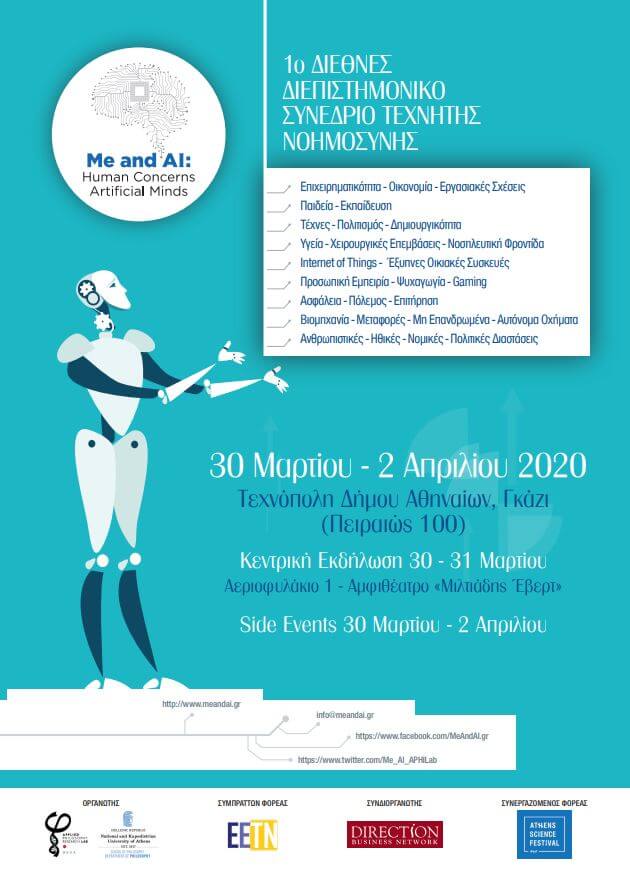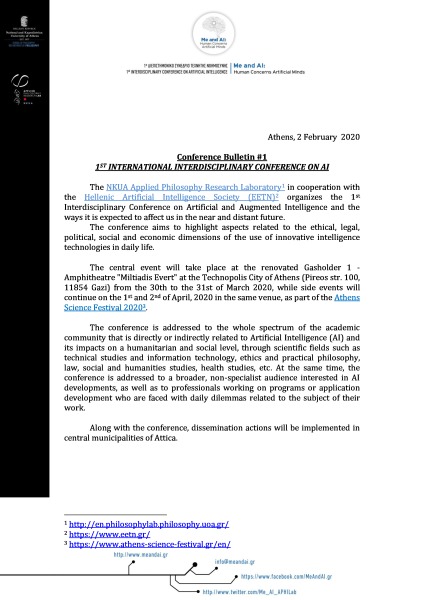Bulletin of Conference #1: 1st International Interdisciplinary Conference on Artificial Intelligence
The NKUA Applied Philosophy Research Laboratory in cooperation with the Hellenic Artificial Intelligence Society (EETN) organizes the 1st Interdisciplinary Conference on Artificial and Augmented Intelligence and the ways it is expected to affect us in the near and distant future.
The conference aims to highlight aspects related to the ethical, legal, political, social and economic dimensions of the use of innovative intelligence technologies in daily life.
The central event will take place at the renovated Gasholder 1 - Amphitheatre "Miltiadis Evert" at the Technopolis City of Athens (Pireos str. 100, 11854 Gazi) from the 30th to the 31st of March 2020, while side events will continue on the 1st and 2nd of April, 2020 in the same venue, as part of the Athens Science Festival 2020.
The conference is addressed to the whole spectrum of the academic community that is directly or indirectly related to Artificial Intelligence (AI) and its impacts on a humanitarian and social level, through scientific fields such as technical studies and information technology, ethics and practical philosophy, law, social and humanities studies, health studies, etc. At the same time, the conference is addressed to a broader, non-specialist audience interested in AI developments, as well as to professionals working οn programs or application development who are faced with daily dilemmas related to the subject of their work.
Along with the conference, dissemination actions will be implemented in central municipalities of Attica.
TOPICS AND CONTENT DESCRIPTION
Entrepreneurship - Economy - Labor Relations: In the near future AI will contribute to the substitution of professions such as workers, teachers, doctors, lawyers and brokers. This prospect constitutes a reason for the redefinition of professional identities and labor relations. At the same time, new business opportunities are created and the financial and commercial environments as well as the work environments of large enterprises are rapidly changing. Opportunities and Threats, Requirements for a New Regulatory Framework. Education - Training: As the capabilities of smart machines improve, so does their interdependence and interaction with humans. Search engines and smart phones are just the beginning. New prospects are being opened daily for knowledge, education, research, sports, etc.
Health: Every day AI is increasingly involved in the process of diagnosing diseases, invasively at the surgical level and finally in rehabilitation issues. What are the consequences and prospects for major technological developments in the health sector?
Internet of Τhings - Smart Home Appliances: In a few years, smart home and business appliances will change our daily lives, saving us time and money. Digital personal assistants will perform a variety of routine tasks. Remote monitoring and control of devices will enable us to increase our daily productivity. But there are also emerging issues related to networking, privacy and behavior, personal security, and more.
Security - War - Surveillance: A large part of war operations is carried out by now with unmanned drone aircrafts. Developments in the fields of national security, public order, private security etc. are rapid and the issue is of great concern to the academic community, states and industries.
Transport - Unmanned Vehicles - Autonomous Vehicles: Already autonomous vehicles circulate on Greek roads (e.g. buses in the Municipality of Trikala) and international car manufacturers have turned all their research interest towards this field. Of particular interest is the way in which things are going to change at a commercial, institutional and day-to-day level (e.g. commuting) over the coming years –from insurance and road and civil liability, to driving rules and licenses, etc.
Entertainment - Gaming - Personal Care: The meaning of "game" itself is changing: new virtual environments, digital adversaries, coaches, aids, etc. The concepts of entertainment, companionship, home care, sex, etc. are changing as well. How close and how far are we from science-fiction scripts and series like Westworld?
Arts - Culture - Creativity: Artificial intelligence writes and plays music, participates in orchestras, paints and evaluates paintings, writes scripts, commercials, and more. Issues such as intellectual property, creativity, aesthetic value, etc. require conceptual redefinition.
SIDE EVENTS
Five (5) side events are scheduled for Me and AI 2020, which will be announced in detail by the end of February.
1. AI training program immersive experience
2. Screening of the documentary "Do You Trust This Computer?" After the screening there will be a roundtable discussion with the participation of the public.
3. Workshop organized by the Applied Philosophy Research Laboratory on "Making Ethical Decisions in the Age of Artificial Intelligence", which will be held at Innovathens.
4. Immersive Experience in a Musical Event with the participation of AI.
5. Debate the Robot: Philosophical discussion and interaction with a smart and friendly robot.
REGARDING THE NKUA APPLIED PHILOSOPHY RESEARCH LAB
The Applied Philosophy Research Lab of the National and Kapodistrian University of Athens is the longest and most active Laboratory of Philosophy in Greece. It was founded in May 1999 as a "Philosophical and Technological Laboratory of Applied and Ecological Philosophy" (Government Gazette 92 / 11.5.1999) and received its current name in 2017 (Government Gazette 3756 / 25.10.2017). It belongs to the Department of Philosophy, which is an independent unit. Its purpose is to meet the research and teaching needs of the Department of Philosophy, especially in the area of Applied Philosophy. The Laboratory seeks to foster collaborations with international organizations and transnational bodies. In this context, since 2016 it has been hosting the Greek Unit of the UNESCO Chair in Bioethics (Haifa). Its goals also include the co-operation with relevant Laboratories, Research Centers, public and private bodies and academic institutions, Greek and foreign. Its main aims (inter alia) are the organization of scientific events (seminars and conferences), the publication of abstracts, scientific series and scientific journals, as well as inviting important Greek and foreign scholars. The Director of the Lab is Mr. Evangelos Protopapadakis, Associate Professor.
For information on academic matters you can contact the President of the Organizing Committee of the conference, Dr. Alkis Gounaris, at alkisg@philosophy.uoa.gr.
For information on publicity and sponsorship issues you can contact Mr. George Sakellopoulos, DIRECTION, at gsak@direction.gr.
Read full text in Greek



